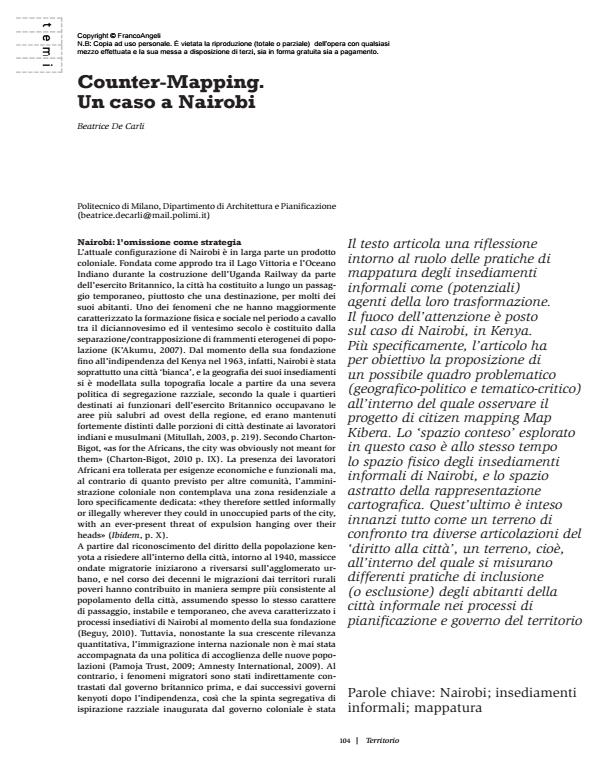Counter-Mapping. Un caso a Nairobi
Titolo Rivista TERRITORIO
Autori/Curatori Beatrice De Carli
Anno di pubblicazione 2012 Fascicolo 2012/61
Lingua Italiano Numero pagine 6 P. 104-109 Dimensione file 1823 KB
DOI 10.3280/TR2012-061018
Il DOI è il codice a barre della proprietà intellettuale: per saperne di più
clicca qui
Qui sotto puoi vedere in anteprima la prima pagina di questo articolo.
Se questo articolo ti interessa, lo puoi acquistare (e scaricare in formato pdf) seguendo le facili indicazioni per acquistare il download credit. Acquista Download Credits per scaricare questo Articolo in formato PDF

FrancoAngeli è membro della Publishers International Linking Association, Inc (PILA), associazione indipendente e non profit per facilitare (attraverso i servizi tecnologici implementati da CrossRef.org) l’accesso degli studiosi ai contenuti digitali nelle pubblicazioni professionali e scientifiche.
This text considers the role of mapping practices for informal settlements as (potential) agents for their transformation. Attention is focused on the case of Nairobi, Kenya. More specifically, the paper has as its objective the proposal of a possible problematic framework (geographical-political and thematic-critical) within which to observe citizen mapping in the Map Kibera Project. The ‘disputed space’ explored in this case is simultaneously the physical space of the informal settlements of Nairobi and the abstract space of cartographic representation. The latter is understood first of all as a land of confrontation between the various expressions of the ‘right to a city’, a land in other words where different practices are appraised of inclusion (or exclusion) of the inhabitants of the informal city in the processes of planning and governing the territory.
Parole chiave:Nairobi; informal settlements; mapping
Beatrice De Carli, Counter-Mapping. Un caso a Nairobi in "TERRITORIO" 61/2012, pp 104-109, DOI: 10.3280/TR2012-061018